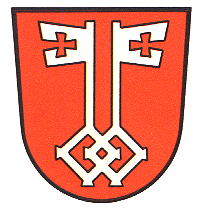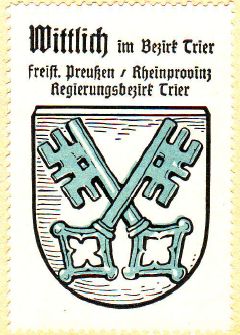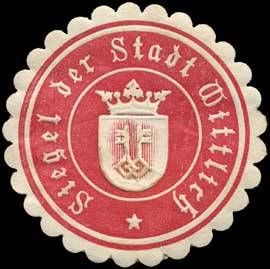Wittlich
This page is part of the German heraldry portal Deutsche Wappensammlung |
Heraldry of the World |
|
German heraldry:
|
Selected collector's items from Germany:
|
WITTLICH
State : Rheinland-Pfalz
District (Kreis) : Bernkastel-Wittlich (until 1969 Wittlich)
Additions : 1969 Bombogen, Dorf, Lüxem, Neuerburg, Wengerohr
| German | |
| English | No blazon/translation known. Please click here to send your (heraldic !) blazon or translation |
Origin/meaning
Wittlich received city rights in 1291 and belonged until 1794 to the State of Trier.
A key placed bendwise appears for the first time on a small seal of the city dating from the early 14th century. The design was not changed until the French occupation. During the French occupation, the seal showed the French eagle. Between +/- 1810 and 1815 the seals of the city showed the German eagle. From +/- 1820 the city seals and arms showed two keys, either partly crossing or separately. The keys were now placed vertically. These arms have remained in use.
The original colours are silver and red, the colours of the State of Trier. In the 19th century also the blue and silver of the Wittelsbach family appears, as the city then belonged to the Pfalz (the Wittelsbach family were Princes of the Pfalz). In the early 20th century the old arms were restored.
The keys are the symbol of St. Peter, patron saint of Trier.
In the early 20th century the arms below were shown in the Kaffee Hag albums, in different colours.
| The arms by Hupp in the Kaffee Hag albums +/- 1925 |
Seal from around 1900 |
Contact and Support
Partners:
Your logo here ?
Contact us
© since 1995, Heraldry of the World, Ralf Hartemink 
Index of the site
Literature: Stadler, 1964-1971, 8 volumes; Kaffee Hag albums 1920s.














